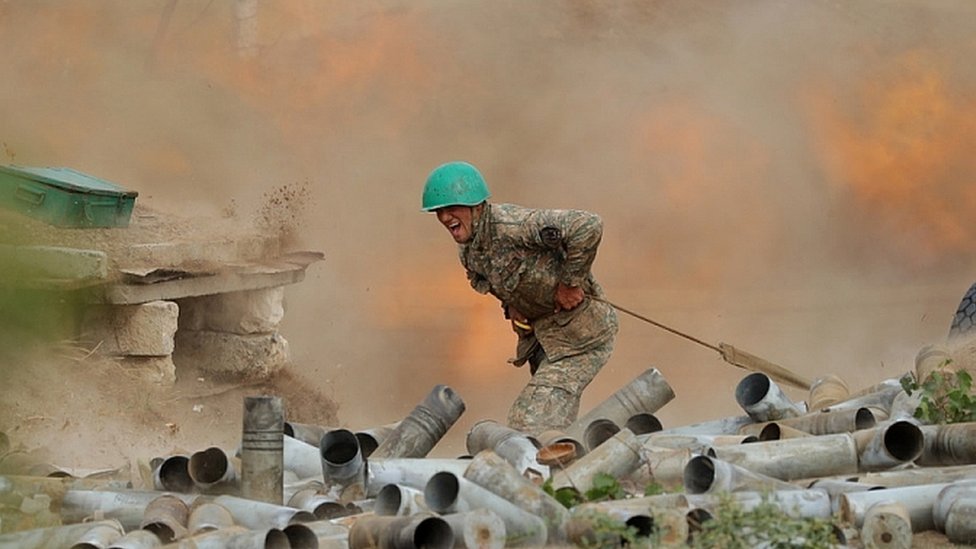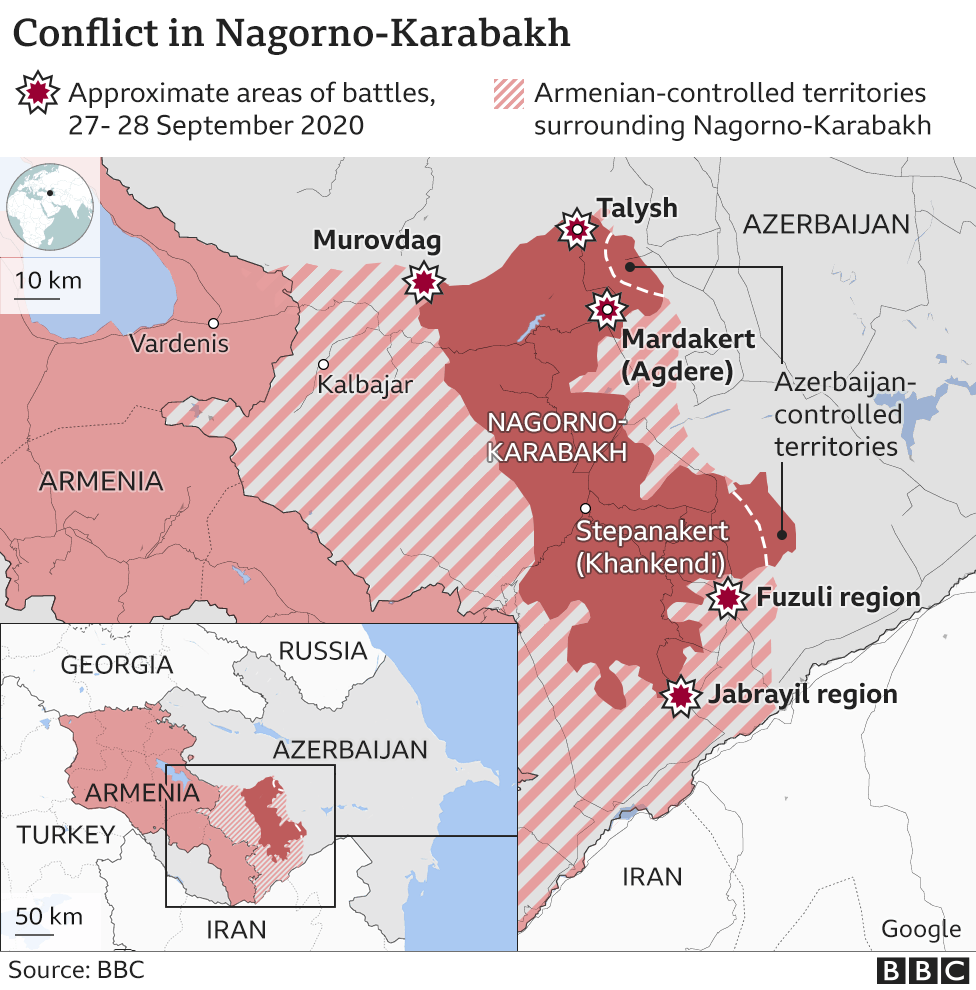
The US, France and Russia jointly condemned the fighting in Nagorno-Karabakh, in the southern Caucasus.
But Turkey - an ally of Azerbaijan - dismissed demands for a ceasefire.
Nagorno-Karabakh is officially part of Azerbaijan but governed by separatist ethnic Armenians. Years of negotiations have never resulted in a peace treaty.
Azerbaijan and Armenia fought a war in 1988-94 over the territory. Armenia backs the self-declared republic but has never officially recognised it.
Heavy shelling persisted overnight in the region's main city, despite mounting international concern.
At least 100 people have reportedly been killed with hundreds wounded in the latest flare-up.
What are international powers saying?
In their statement, Russian President Vladimir Putin, French President Emmanuel Macron and US President Donald Trump called for an "immediate cessation of hostilities".
"We also call on the leaders of Armenia and Azerbaijan to immediately commit themselves to resume negotiations on the substance of the settlement in good faith and without preconditions," it said.
The three were speaking as co-chairs of the OSCE Minsk Group, which was founded in the early 1990s to try to find a peaceful solution to the Nagorno-Karabakh conflict.
Russia is part of a military alliance with Armenia and has a military base in the country. However, it also has close ties to the government of Azerbaijan.
But Turkish President Recep Tayyip Erdogan rubbished the efforts, saying a ceasefire was only possible if Armenia ended its "occupation" of Azerbaijani territory.


"Given that the USA, Russia and France have neglected this problem for nearly 30 years, it is unacceptable that they are involved in a search for a ceasefire," he said.
Mr Macron's office also expressed "concern" over reports that Syrian mercenaries had been transported to Azerbaijan by Turkish security companies.
One fighter told BBC Arabic earlier this week he had been recruited in northern Syria and sent via Turkey to fight in the conflict. Abdullah - not his real name - said he had been sent to Nagorno-Karabakh "wearing Azerbaijani uniform" soon after the fighting broke out.
But Turkey has disputed that claim, and an adviser to Turkish President Recep Tayyip Erdogan dismissed the report as "completely unfounded". Azerbaijan's ambassador to the US has also denied reports of Turkish involvement.
The Syrian Observatory for Human Rights reports that about 900 Syrian mercenaries have been transported to Azerbaijan by Turkish security companies. But they add that Armenian-born fighters in Syria have also been transported to Armenia to join the fight.

Escalation risks a wider regional war
Analysis by Laurence Broers, South Caucasus expert at Chatham House
Previous escalations between Armenian and Azerbaijani forces were contained after a few days. The intensity of the current fighting indicates that this may not be possible this time.
Populated areas within the contested territory of Nagorno-Karabakh have been hit by missile strikes and bombardments for the first time since the 1990s. Civilian targets in Armenia and in Azerbaijan have also been hit.
Both sides appear to be digging in for a longer conflict.
Azerbaijan has rejected renewed negotiations with Armenia, and compared with previous escalations it has a greater degree of Turkish support to count on.
The danger here is that a longer, protracted, conflict will see increased involvement by outside powers and risk a wider regional war.

What's happening on the ground?
Heavy shelling continued into Thursday, and both sides claimed to have inflicted damage.
Azerbaijan's defence ministry said it had carried out "crushing artillery strikes against Armenian forces' positions" throughout the night.
Meanwhile, officials in Nagorno-Karabakh said the situation there was "tense" and fire had been exchanged.
"The enemy attempted to regroup its troops, but Armenian forces suppressed all such attempts," they said in a statement, according to the AFP news agency.
Two French journalists for the Le Monde newspaper were also injured during shelling in the nearby Armenian town of Martuni.
Azerbaijan published video of what it said was the destruction of two "enemy" tanks and reported that an Armenian battalion had fled the area around the village of Tonashen.
Armenian media said three civilians had been killed in an Azerbaijani air attack on the town of Martakert on Wednesday. State news agency Armenpress said seven civilians and 80 service personnel had been killed since the fighting began.
Armenia's defence ministry also released a picture of an Armenian SU-25 jet it said had been shot down by a Turkish F-16 on Tuesday. Turkey, a staunch ally of Azerbaijan, has rejected the allegation as "cheap propaganda".

Nagorno-Karabakh - key facts
- A mountainous region of about 4,400 sq km (1,700 sq miles)
- Traditionally inhabited by Christian Armenians and Muslim Turks
- In Soviet times, it became an autonomous region within the republic of Azerbaijan
- Internationally recognised as part of Azerbaijan, but majority of population is ethnic Armenian
- Self-proclaimed authorities are not recognised by any UN member, including Armenia
- An estimated one million people displaced by war in 1988-94, and about 30,000 killed
- Separatist forces captured some extra territory around the enclave in Azerbaijan
- Stalemate has largely prevailed since a 1994 ceasefire
- Turkey openly supports Azerbaijan
- Russia has a military base in Armenia

"conflict" - Google News
October 01, 2020 at 09:05PM
https://ift.tt/3ilvLQ4
Armenia-Azerbaijan: Both sides defy Nagorno-Karabakh ceasefire calls - BBC News
"conflict" - Google News
https://ift.tt/3bZ36xX
https://ift.tt/3aYn0I8
Bagikan Berita Ini














0 Response to "Armenia-Azerbaijan: Both sides defy Nagorno-Karabakh ceasefire calls - BBC News"
Post a Comment